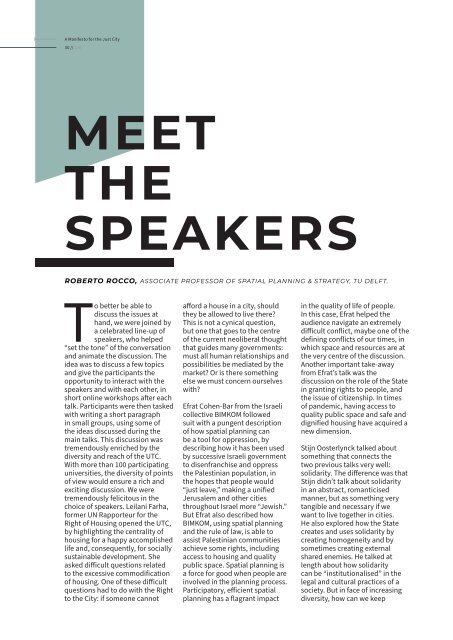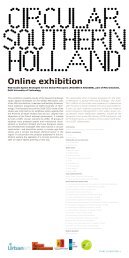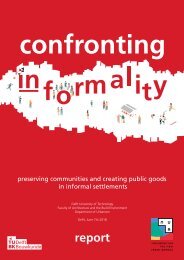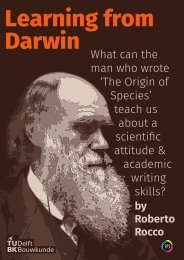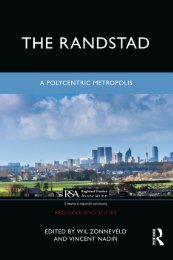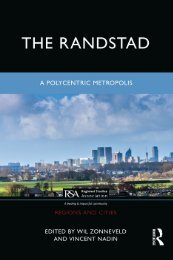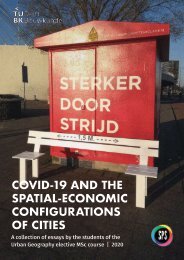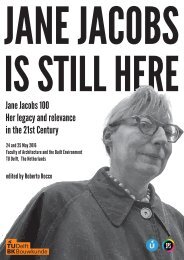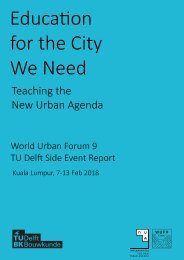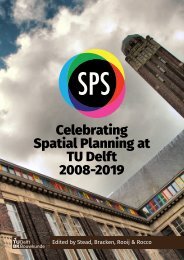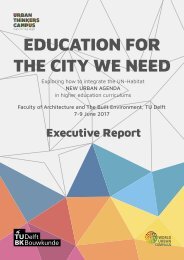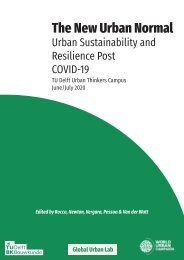A Manifesto for the Just City
On Monday 29 MARCH at 18:00 (CET/Amsterdam), TU Delft launched the Book "A Manifesto for the Just City", with texts by a number of guests and 43 manifestos written by students from 25 universities from all over the world. A “Manifesto for the Just City” comes in the wake of the realisation that socio-spatial justice is a crucial dimension for sustainability transitions. Growing inequality and the erosion of the public sphere undermine the social and political structures required to fight climate change, pandemics and other systemic shocks. With this book, we have sought to encourage students to formulate their own visions for the Just City and for a just transition. This book is result of an Urban Thinkers Campus organised between 9 and 30 November 2020. The Urban Thinkers Campus (UTC) model is an initiative of UN-Habitat’s World Urban Campaign, conceived in 2014 as an open space for critical exchange between stakeholders and partners. It aims to promote debate and action on sustainable and inclusive urbanization upholding the principles and guidelines contained in the New Urban Agenda, launched at Habitat-III in 2016 in Quito, Ecuador.
On Monday 29 MARCH at 18:00 (CET/Amsterdam), TU Delft launched the Book "A Manifesto for the Just City", with texts by a number of guests and 43 manifestos written by students from 25 universities from all over the world.
A “Manifesto for the Just City” comes in the wake of the realisation that socio-spatial justice is a crucial dimension for sustainability transitions. Growing inequality and the erosion of the public sphere undermine the social and political structures required to fight climate change, pandemics and other systemic shocks. With this book, we have sought to encourage students to formulate their own visions for the Just City and for a just transition.
This book is result of an Urban Thinkers Campus organised between 9 and 30 November 2020. The Urban Thinkers Campus (UTC) model is an initiative of UN-Habitat’s World Urban Campaign, conceived in 2014 as an open space for critical exchange between stakeholders and partners. It aims to promote debate and action on sustainable and inclusive urbanization upholding the principles and guidelines contained in the New Urban Agenda, launched at Habitat-III in 2016 in Quito, Ecuador.
Create successful ePaper yourself
Turn your PDF publications into a flip-book with our unique Google optimized e-Paper software.
A <strong>Manifesto</strong> <strong>for</strong> <strong>the</strong> <strong>Just</strong> <strong>City</strong><br />
30 // 276<br />
MEET<br />
THE<br />
SPEAKERS<br />
ROBERTO ROCCO, ASSOCIATE PROFESSOR OF SPATIAL PLANNING & STRATEGY, TU DELFT.<br />
To better be able to<br />
discuss <strong>the</strong> issues at<br />
hand, we were joined by<br />
a celebrated line-up of<br />
speakers, who helped<br />
“set <strong>the</strong> tone” of <strong>the</strong> conversation<br />
and animate <strong>the</strong> discussion. The<br />
idea was to discuss a few topics<br />
and give <strong>the</strong> participants <strong>the</strong><br />
opportunity to interact with <strong>the</strong><br />
speakers and with each o<strong>the</strong>r, in<br />
short online workshops after each<br />
talk. Participants were <strong>the</strong>n tasked<br />
with writing a short paragraph<br />
in small groups, using some of<br />
<strong>the</strong> ideas discussed during <strong>the</strong><br />
main talks. This discussion was<br />
tremendously enriched by <strong>the</strong><br />
diversity and reach of <strong>the</strong> UTC.<br />
With more than 100 participating<br />
universities, <strong>the</strong> diversity of points<br />
of view would ensure a rich and<br />
exciting discussion. We were<br />
tremendously felicitous in <strong>the</strong><br />
choice of speakers. Leilani Farha,<br />
<strong>for</strong>mer UN Rapporteur <strong>for</strong> <strong>the</strong><br />
Right of Housing opened <strong>the</strong> UTC,<br />
by highlighting <strong>the</strong> centrality of<br />
housing <strong>for</strong> a happy accomplished<br />
life and, consequently, <strong>for</strong> socially<br />
sustainable development. She<br />
asked difficult questions related<br />
to <strong>the</strong> excessive commodification<br />
of housing. One of <strong>the</strong>se difficult<br />
questions had to do with <strong>the</strong> Right<br />
to <strong>the</strong> <strong>City</strong>: if someone cannot<br />
af<strong>for</strong>d a house in a city, should<br />
<strong>the</strong>y be allowed to live <strong>the</strong>re?<br />
This is not a cynical question,<br />
but one that goes to <strong>the</strong> centre<br />
of <strong>the</strong> current neoliberal thought<br />
that guides many governments:<br />
must all human relationships and<br />
possibilities be mediated by <strong>the</strong><br />
market? Or is <strong>the</strong>re something<br />
else we must concern ourselves<br />
with?<br />
Efrat Cohen-Bar from <strong>the</strong> Israeli<br />
collective BIMKOM followed<br />
suit with a pungent description<br />
of how spatial planning can<br />
be a tool <strong>for</strong> oppression, by<br />
describing how it has been used<br />
by successive Israeli government<br />
to disenfranchise and oppress<br />
<strong>the</strong> Palestinian population, in<br />
<strong>the</strong> hopes that people would<br />
“just leave,” making a unified<br />
Jerusalem and o<strong>the</strong>r cities<br />
throughout Israel more “Jewish.”<br />
But Efrat also described how<br />
BIMKOM, using spatial planning<br />
and <strong>the</strong> rule of law, is able to<br />
assist Palestinian communities<br />
achieve some rights, including<br />
access to housing and quality<br />
public space. Spatial planning is<br />
a <strong>for</strong>ce <strong>for</strong> good when people are<br />
involved in <strong>the</strong> planning process.<br />
Participatory, efficient spatial<br />
planning has a flagrant impact<br />
in <strong>the</strong> quality of life of people.<br />
In this case, Efrat helped <strong>the</strong><br />
audience navigate an extremely<br />
difficult conflict, maybe one of <strong>the</strong><br />
defining conflicts of our times, in<br />
which space and resources are at<br />
<strong>the</strong> very centre of <strong>the</strong> discussion.<br />
Ano<strong>the</strong>r important take-away<br />
from Efrat’s talk was <strong>the</strong><br />
discussion on <strong>the</strong> role of <strong>the</strong> State<br />
in granting rights to people, and<br />
<strong>the</strong> issue of citizenship. In times<br />
of pandemic, having access to<br />
quality public space and safe and<br />
dignified housing have acquired a<br />
new dimension.<br />
Stijn Oosterlynck talked about<br />
something that connects <strong>the</strong><br />
two previous talks very well:<br />
solidarity. The difference was that<br />
Stijn didn’t talk about solidarity<br />
in an abstract, romanticised<br />
manner, but as something very<br />
tangible and necessary if we<br />
want to live toge<strong>the</strong>r in cities.<br />
He also explored how <strong>the</strong> State<br />
creates and uses solidarity by<br />
creating homogeneity and by<br />
sometimes creating external<br />
shared enemies. He talked at<br />
length about how solidarity<br />
can be “institutionalised” in <strong>the</strong><br />
legal and cultural practices of a<br />
society. But in face of increasing<br />
diversity, how can we keep


